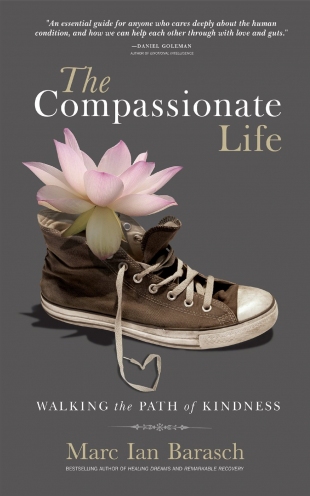In a world twisted with tension, violence, and divisions based on race, class, gender, ethnicity, and sexual orientation, compassion and her sisters — loving-kindness, empathy, altruism, forgiveness, and social reconciliation — comprise the best possible hope for humanity's survival. Marc Ian Barasch gave us trenchant overviews of some of the most important spiritual subjects of our time in his pioneering works The Healing Path,, Remarkable Recovery, and Healing Dreams. This soul-stirring and enlightening volume contains an impressive array of material gleaned from science, religion, theology, psychology, and the author's own adventures while trying to live a compassionate life. On this quest, Barasch keeps his senses on full alert and his mind and heart open.
"I wonder if those of us alive today aren't seeing prefigurations of a time when the binding of wounds takes precedence over the binding of captives; the beginning of a new covenant to heal the damage done by not caring passionately enough about what happens to each other," he writes. "I get the feeling history's moving finger has written only the first few lines of that story. If we can stick around for a while, it's gonna be a page-turner." Consider the fascinating accounts, profiles, experiments, vignettes, and spiritual practices on these pages as previews of good things to come.
The Dalai Lama, Archbishop Desmond Tutu, and Nelson Mandela are all exemplary practitioners of compassion, that special quality that enables us to put others first and to treat them with respect, even if they are enemies. Barasch identifies many others who incarnate this brand of kindness, including a man who gave his kidney to a stranger, a woman who does weekly hospice work and seems to have been born "with some endowment of solar warmth," and a freelance mediator who has gone around the world teaching people to empathize with one another. Barasch hits the streets of Denver to live as a homeless person, a practice of the Zen Peacemaker Order. He visits Doc Childre of the Institute of HeartMath where experiments are being conducted to see if caring promotes overall well-being, and he travels to St. Benedict Monastery to talk with Father Thomas Keating. He ponders the importance of heart practices among Sufis, Eastern Orthodox believers, and Tibetan Buddhists. After considering the stories of Gentiles who saved Jews during the Holocaust, he trains his eyes on the conflicts in the Middle East between Israelis and Palestinians and in Rwanda between the Hutus and the Tutsis.
Compassion is not an easy practice since the ego and its enticements resist unlocking the heart. Barasch cites a poll that shows most people in the world favor this spiritual virtue as the one that can solve many of our global problems. He concludes: "A society based on universal compassion is not just our only hope; it is an evolutionary imperative." This highly readable book is an impressive achievement.
